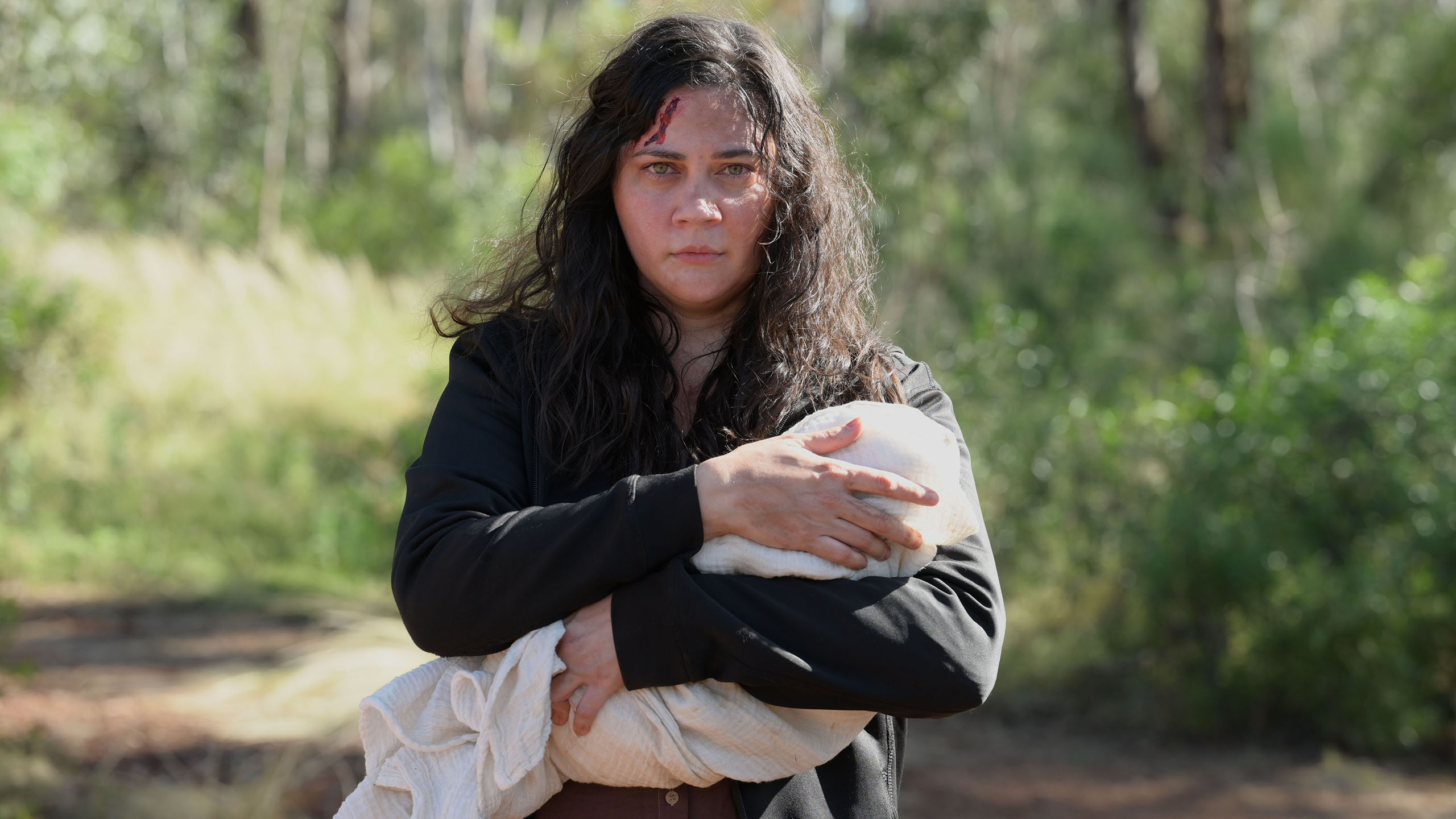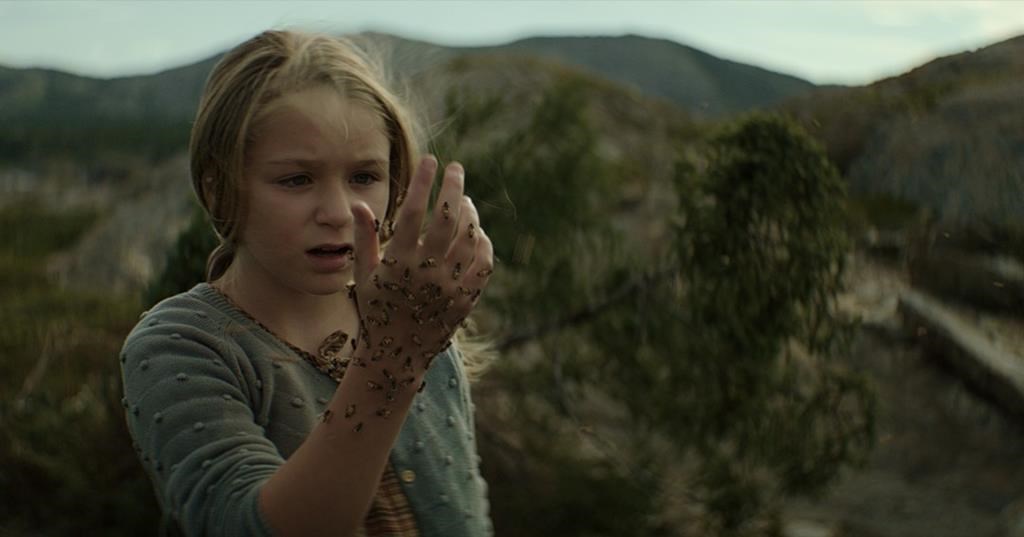Reviews
‘The Moogai’ Sundance Review – The Monster is a Metaphor (Again)

Over the course of six decades (1910-1970), tens of thousands of Australian Aboriginal children were forcibly removed from their homes due to the assimilation policies that were in place at the time. These policies claimed that the lives of First Nations people would be improved if they became part of white society, and an effort to breed out color from the Aboriginal population was carried out. Unsurprisingly, the lives of the removed children were not improved, with studies showing that many of them developed adverse reactions to their removal like mental health issues, drug and alcohol abuse, among others. These children became known as The Stolen Generation, and their experiences left a black mark in Australia’s history.
Writer/director Jon Bell, adapting his award-winning 2021 short film of the same name, taps into this unsavory event with The Moogai, yet another monster-as-a-metaphor horror drama that mostly succeeds when it acts as a drama, but falls short when it shifts into genre territory.
The Moogai introduces us to Sarah (Shari Sebbens, reprising her role from the short film), an Aboriginal woman who was removed from her mother’s home and placed with a white family. When we meet her, she is about to give birth to her second child with her husband Fergus (Meyne Wyatt, also reprising his role from the short). A near-death scare during the birth causes Sarah’s repressed trauma to resurface in the form of the Moogai, a malevolent spirit who has designs on her new baby. Struggling to come to terms with her birth mother Ruth (Tessa Rose) and dealing with years of unresolved trauma, Sarah’s mental state begins to deteriorate as the Moogai moves closer and closer to her and her newborn child.
The Moogai is the rare film to be adapted from a short that has too many elements at play. Bell introduces subplot after subplot, quickly establishing a conflict before moving on to the next one. The script feels more like an outline for a feature than a fully-developed one, as most of these subplots aren’t given much attention beyond their single scenes. They all play a part in Sarah’s mental deterioration, but it’s disappointing that nothing about these scenes operate for any other reason. Bell has plenty of material to fill a feature-length film, but seems resistant to stay in one place for too long. Subplots involving Sarah’s co-worker Becky (Bella Heathcote, Relic) disappear as quickly as they’re introduced. A confrontation with a rude teacher (Alexandra Jensen, Talk to Me) similarly doesn’t amount to much, other than to reiterate that everyone around Sarah is starting to believe that she is losing her mind.
There’s a distinct emotional charge to the scenes that Sarah shares with her birth mother, and they resonate deeply. Sarah not only views her mother as less than, but doesn’t even consider her to be her real mother. Efforts on Ruth’s part to help Sarah fall on deaf ears, with Sarah dismissing Ruth’s unfamiliar Aboriginal practices as nothing more than superstitious dreck. These moments stand out the most, whereas the two scenes Sarah shares with her adoptive mother Annette (Tara Morice) frustrate because Bell resists the urge to dive into that relationship in any sort of meaningful way.
Much like last year’s other Australian Sundance outing Run Rabbit Run (review), The Moogai is bound to draw comparisons to The Babadook (fitting, as that film had its world premiere at Sundance 10 years ago and shares a few producers with The Moogai). Like that film, it also suffers from the use of uninspired horror tropes to get a rise out of the viewer. Nightmare fake-out scares are aplenty, Sarah hallucinates snakes that aren’t there (or are they?), little ghost girls with white eyes occasionally pop up to offer Sarah cryptic warnings about the Moogai (“He’s coming.” “He’s watching you.” “He’s coming for them.”), and the eponymous creature serves as a metaphor for Sarah’s trauma. It’s par for the course at this point, but it comes across as lazy when it should have been inspired.
Having the Moogai act a metaphor for Sarah’s generational trauma is nothing the genre hasn’t seen before, but The Moogai barely scratches the surface when it comes to the lasting effects of Sarah’s removal from her mother’s home. It’s a credit to Sebbens’ performance that it works as well as it does, but Bell’s screenplay, with its refusal to stay in one place for too long, lacks a cohesive narrative. That being said, Sebbens’ commands the screen in her scenes, even if the film surrounding her isn’t pulling the same amount of weight.
It’s not all for naught, though, as the climactic confrontation with the titular beast elicits the necessary thrills. The creature itself is brought to life by impressive practical effects and a creepy physical performance from actor Paul Chambers. There are times when the sequence can be a bit hokey, such as a moment when Sarah offers a cliché one-liner as she attacks the beast, but the intended effect is successfully achieved for the most part.
There is a very important story being told in The Moogai. It’s just a shame that it isn’t given the proper attention it deserves, with Bell opting for cheap scares and surface-level observations instead of something richer. The pieces are all there, but the execution is lacking, making for a film that’s content being aggressively fine when it could have been something much more resonant.
The Moogai premiered at the Sundance Film Festival. Release date TBA.


Reviews
‘The King Tide’: An Island Town Rots with Moral Decay in Canadian Folk Horror Fable [Review]

The opening scenes of director Christian Sparkes’ The King Tide set an ominous tone: a powerful storm takes down the power lines of a small island town as a pregnant woman loses her child while her dementia-suffering mother sits nearby. In the morning, as the town takes stock of the damage and the power is restored, a surprising discovery is found in an overturned boat in the harbour: a baby girl…with the ability to heal.
Writers Albert Shin and William Woods, working from a story by Kevin Coughlin and Ryan Grassby, treat the story as something of a morality tale mixed with a fable. Following the cold open, the action jumps ahead 10 years at a point when the unnamed island (the film was shot in Newfoundland, Canada) is thriving. The fishing is bountiful, the islanders are self-sufficient and have cut ties with the mainland, and most everyone is happy.
As characters are prone to saying, it’s all thanks to Isla (Alix West Lefler), the miracle baby who has grown up worshipped by the islanders. While Mayor Bobby Bentham (Clayne Crawford) and his wife Grace (Lara Jean Chorostecki) endeavor to raise Isla like any other little girl, the reality is that the island’s entire ecosystem revolves around her miraculous powers. It is only because of Isla that they survive; every aspect of their lives – from medicine to food – relies on her.
Each day the citizens line up for their allotted time with the young girl – be it to stave off breast cancer, like Charlotte (Kathryn Greenwood), or recover from another night of heavy drinking like former doctor, Beau (Aden Young). There’s even a predetermined schedule for when she will go out on the boats and use her power to lure fish into the nets.

One fateful day, Bobby succumbs to peer pressure and alters Isla’s schedule at the last minute to accompany cod fishermen Marlon (Michael Greyeyes) and Dillon (Ryan McDonald). A childish game with fatal consequences is played, but with Isla indisposed, a young boy, who would have otherwise been fine, dies. And while the rest of the community grieves, it is Isla who is completely shaken and, unexpectedly, loses her powers.
Suddenly the entire balance of the island is thrown off. Folks like Grace’s mother, Faye (Frances Fisher), who relied on Isla to keep her dementia at bay, suddenly reckon with mortality, while the food security of the town is called into question. Faye’s late-night “support group” meetings take on an urgent and secretive tone and the townspeople claim ownership of Isla’s time despite Bobby and Beau’s protests that she needs rest to recover from her trauma.
Like the best thrillers, the politics and personalities within the community come into play as morals are compromised and the good of individuals vs the collective is played out in increasingly desperate situations. The King Tide excels because it is interested in exploring the competing motivations of the townspeople, while also resolutely refusing to paint anyone as inherently good or bad. These are desperate people, determined to remain independent and free from outside interference, while protecting their trapped-in-amber way of life.

These developments work because there’s a humanity to the characters and The King Tide wisely relies heavily on its deep bench castoff character actors to drive the conflict. Crawford is the de facto protagonist of the ensemble and he’s also the most straightforward character: Bobby is a good man and a loving father, but he’s no white knight. At several points in the film, his willingness to acquiesce to the demands of the community and retain his power causes events to spiral further out of control.
Even more fascinating are Grace and Faye, two commanding women whose capacity for maternal love is matched – or eclipsed – by their own self-interests. A mid-film discovery about Isla’s power reframes Grace’s priorities, ultimately pitting her against her husband. As a result, Grace is incredibly compelling and frustrating (in a good way) and Chorostecki, who has done great genre work on both Hannibal to Chucky, plays the moral ambiguity exactly right. Grace is a fascinating and flawed human character in a film filled with them.
The same goes for Fisher, who deftly balances Faye’s grandmotherly love for Isla with the needs of the community and, by extension, her own health demands. In the hands of a lesser performer, it would be easy to hate Faye for her actions, but Fisher’s performance perfectly captures the fierce determination and fear that drives the island’s matriarch.
Finally, there’s Aden Young, The King Tide’s secret weapon. The ten-year jump reveals that Beau has undergone the most significant transformation: while everyone else has benefitted from Isla’s powers, her presence has eliminated the need for a doctor. With the clinic effectively shuttered, Beau has become an alcoholic; a shell of his former self with no purpose.
Like Bobby, Beau is the easiest character to root for because of his selfless desire to protect Isla, but Young (renowned for his work with Crawford on Rectify) unlocks the character’s tragic pathos and, in the process, becomes the film’s emotional anchor.

Framing the moral decline of the islanders and anticipating the unexpectedly devastating climax is the natural beauty of Newfoundland. As shot by cinematographer Mike McLaughlin, there’s a steely beauty to the geography, resplendent with rocky cliffs, pounding surf, and gusty bluffs that reinforce the islanders’ isolation.
There’s a fierce pride in their struggle to survive independently, evident in the simple lodgings and the antiquated alarm bell that is rung whenever fishing ships from the mainland stray too close. It’s a chilly, atmospheric calling card for one of the most picturesque provinces in Canada, but it is a perfect complement for the folk horror narrative.
Armed with serene, beautiful cinematography, murky moral developments, and a deep bench of talented character actors, The King Tide is a quiet gem that demands to be seen. It’s one of the year’s best genre films.
The King Tide is in theaters April 26, 2024.














You must be logged in to post a comment.